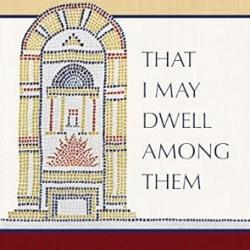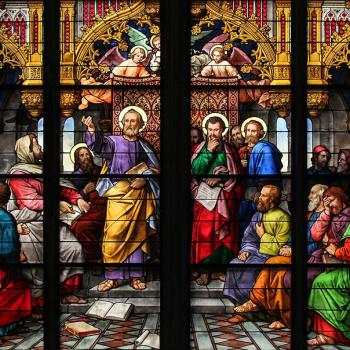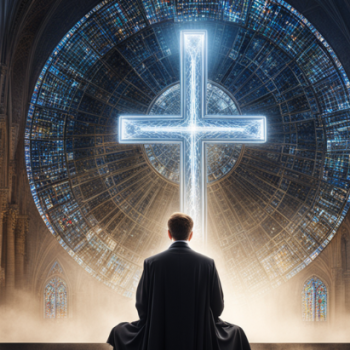I also hope the film will appeal to people who have walked away from or written off Christianity for one reason or another. I'd like to encourage them to take a second look, because if the only message they've ever heard is one of judgment and exclusion, they may have actually rejected Christianity without ever having experienced it.
Do I think this movie can actually change minds? That is certainly my highest hope. I've already witnessed that process amongst my crew and other people associated with the film. The end game, of course, is to help contribute to a world where our religious beliefs bring us closer together rather than serve as yet another means to divide us into warring factions.
A friend of mine watching the film with me, while finding it completely convincing, raised an interesting question. He asked, once you start questioning the logic of hell, what's to stop you from taking on everything "sacred" in the Christian tradition, such as the Virgin Birth, or the Resurrection, or even the existence of God in the first place? What would you say to him?
Your friend is exactly right. I think this is what so many people are afraid of. Like it or not, most of modern Christianity can be reduced to a hell-avoidance plan, as Brian McLaren puts it in our film. Take away hell -- or at least the way hell has been traditionally understood in Western Christianity -- and it seems like the entire story falls apart. All sorts of questions spring up: If Jesus didn't die to save us from hell, what was that all about? Who is God? What is the Bible? If becoming a Christian doesn't save me from hell, what's the point? Rather than fear such questions, I welcome them, because these are the same questions people have been asking from the beginning, and if we think anyone has answered them definitely, we're fooling ourselves.
As my friend Ron Dart says, every point of view reveals some things and conceals others. The problem is, we fall so in love with what our perspective reveals that we completely forget about potential blind spots. Because of their circumstances, people in the past could see things in the Bible that we can't. But they were completely oblivious to other elements. The same is true today. Thanks to globalization, the Internet, quantum physics, increased longevity and so on, we have a perspective on the Bible and other areas of life unrivalled in the history of the world. It's only natural that this perspective would cause us to question inherited orthodoxies. This isn't something to be feared; it's just the way life is. Thomas Kuhn is most famous for his book The Structure of Scientific Revolutions, in which he argued that science proceeds primarily through a series of paradigm-shifting revolutions rather than mere incremental gains in knowledge. I think theology proceeds in much the same way.
This is a fearful thought for many people, because it seems to place notions of universal truth or objective reality in jeopardy. I disagree. All it does is acknowledge that our perspective on reality will always be limited and imperfect. So we should welcome them, because there's no way we can figure things out on our own. We need to listen to those who have gone before us, and we need to listen to people today who vehemently disagree with us, because it's likely they're seeing something we are missing. We run into trouble when our identity becomes so wrapped up with our point of view that we see new information as a threat rather than an opportunity. I realize this is infinitely more difficult if you believe the eternal fate of billions is riding on your interpretation of the Bible. Thankfully, I'm not burdened by such a belief. I believe we are all in good hands -- God's hands.
What was the hardest thing about making your film?
Maintaining diplomatic relations with people whose position on hell differs from mine. I felt like I was on thin ice with several interview subjects who might pull the plug the minute they realized I didn't share their views, because many people aren't interested in dialogue or having their views critiqued. They're out there saving people from hell, so anyone who gets in the way of that is essentially hindering the progress of the gospel. It's not that I have a hard time with people who disagree with me; it's just that such people tend to view people like me as public enemy number one. It's one thing to have someone outside the camp question your beliefs; it's quite another thing to have someone on the "inside" start asking uncomfortable questions -- especially in public.
Did your own thinking about hell change in the course of making the film?
Going into this project, I think it's fair to say I knew a lot more about the theological landscape on this topic than your average Christian. However, nothing prepared me for the wholesale transformation of my views that has occurred over the past couple of years. I'm not just talking about my views on hell, I'm talking about everything -- God, the Bible, death, violence -- you name it. It's been the most liberating experience of my life. And it's far from over! I realize many people will call me a heretic after watching this film. Some already have. Ironically, I've never considered the Bible, the gospel, Jesus, and being a Christian so important. I truly believe I have discovered "deep wisdom from the dawn of time," and I never shut up about it. I've never been so biblical, Christological, and evangelistic in my beliefs. If that makes me a heretic, I guess I'll have to learn to embrace that label.





